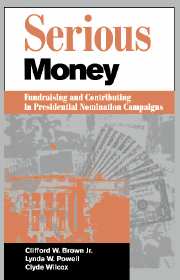Book contents
- Frontmatter
- Contents
- List of figures and tables
- Acknowledgments
- 1 Introduction
- 2 The regulatory environment
- 3 The contributor pool
- 4 Mobilizing the pool: Methods of soliciting campaign funds
- 5 Candidate resources
- 6 Recruiting contributors and solicitors: Candidate and individual decisions
- 7 Conclusion
- Appendix I The 1988 and 1992 presidential nomination surveys
- Appendix II 1988 and 1992 survey items used in the analysis
- Notes
- Bibliography
- Index
4 - Mobilizing the pool: Methods of soliciting campaign funds
Published online by Cambridge University Press: 27 August 2009
- Frontmatter
- Contents
- List of figures and tables
- Acknowledgments
- 1 Introduction
- 2 The regulatory environment
- 3 The contributor pool
- 4 Mobilizing the pool: Methods of soliciting campaign funds
- 5 Candidate resources
- 6 Recruiting contributors and solicitors: Candidate and individual decisions
- 7 Conclusion
- Appendix I The 1988 and 1992 presidential nomination surveys
- Appendix II 1988 and 1992 survey items used in the analysis
- Notes
- Bibliography
- Index
Summary
The pool of serious money contributors is a resource to be mobilized, not a force that presses itself on presidential hopefuls. People do not give to candidates spontaneously, but because they are asked to give. Successful candidates must therefore develop strategies to determine who has the greatest potential to contribute money to the campaign, and how to tap such people.
Campaigns make decisions about how to try to collect money by estimating how to get the greatest return for the least commitment of resources (e.g., money, candidate time, staff time). Ultimately the composition of each candidate's financial constituency is a function of the candidate's resources and the campaign's decisions about how to take advantage of them. These decisions result in the specific choices of whom to approach and how to approach them.
There are two basic methods of raising money in presidential campaigns. Candidates can hire direct mail or telemarketing firms to solicit citizens whose names appear on various lists. Candidates can also attempt to build networks of solicitors who ask their friends and business associates to contribute money. Many candidates use both approaches, but in 1988 each candidate used one of these techniques far more than the other.
There are differences among candidates in the optimal ways to raise money because potential contributors respond to different candidate characteristics in deciding whether or not to make a contribution. Successful impersonal solicitations are likely to involve strong emotional appeals by candidates who represent the ideological wings of their party.
- Type
- Chapter
- Information
- Serious MoneyFundraising and Contributing in Presidential Nomination Campaigns, pp. 50 - 68Publisher: Cambridge University PressPrint publication year: 1995

